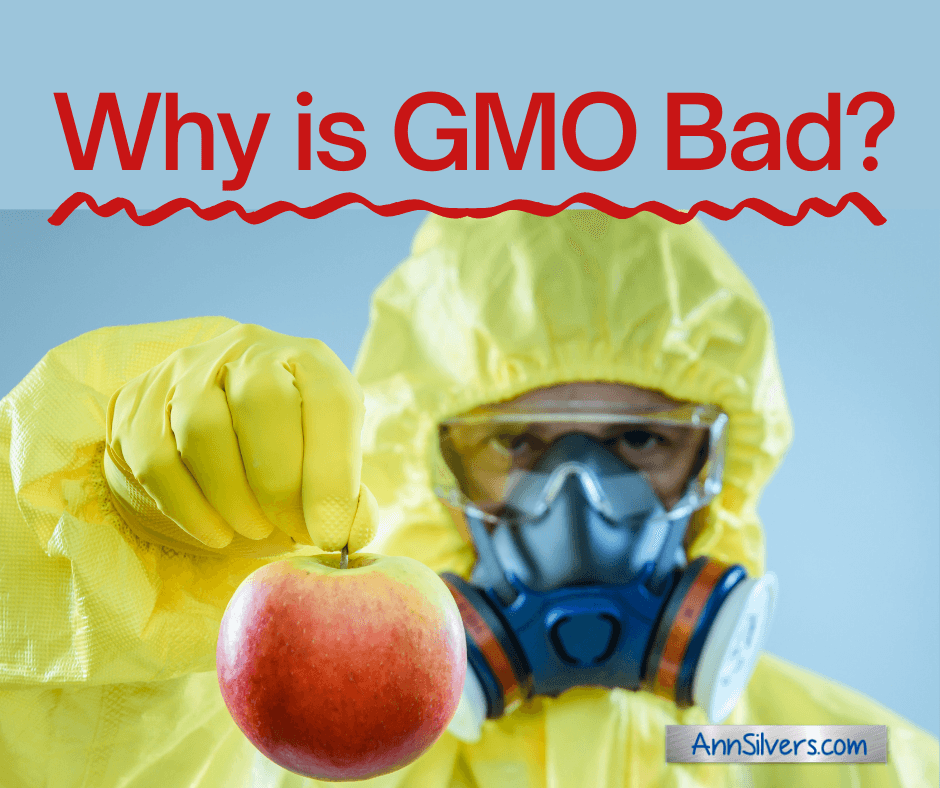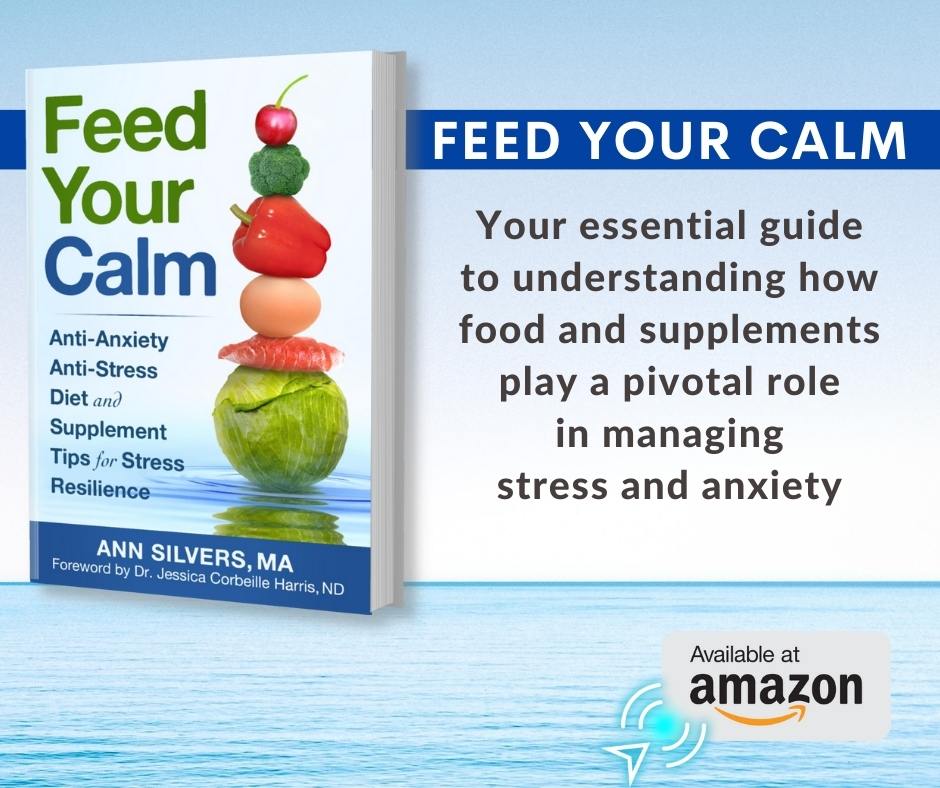Why is GMO bad?

GMO foods are created from genetically modified seeds. The concept itself could be a good thing. In theory, seeds can be modified to benefit humanity.
So, what’s all the fuss about GMO foods?
The reality is that most seed genetic modifications are not created for benevolent purposes. They are created by big corporations to line their pockets without consideration for the cost to the environment and the people who eat the food.
GMO Health Risks, Food List, and Anxiety Connection
| GMO Definition: What Genetically Modified Organism Means |
| Are GMOs Safe? Breaking Down the Controversy |
| What are the Most Common Genetically Modified Foods? |
| Are GMOs Dangerous? Research-Backed Health Risks of Genetically Modified Foods |
| How GMO Foods May Increase Anxiety and Stress |
| Eat to Beat Anxiety: What Helps and What Hurts |
GMO Definition: What Genetically Modified Organism Means
GMO stands for Genetically Modified Organisms. The World Health Organization defines GMOs as “organisms in which the genetic material (DNA) has been altered in such a way that does not occur naturally.”
Genetically modifying seeds is a relatively new thing. Since the first GMO seeds were field tested in the late 1980s, their use has taken over some crops to the point where 90% of corn and soybeans grown in the US, as well as Canola grown in Canada, are genetically modified. (Sources: Time, 2015; Science Codons, 2025)
Are GMOs Safe? Breaking Down the Controversy
This statement on the WHO website gives you a window into one of the glaring things that is wrong with GMO foods:
“Most existing genetically modified crops have been developed to improve yield, through the introduction of resistance to plant diseases or of increased tolerance of herbicides.”
Herb, the root of the word herbicides, represents plants. Cides means killer. Herbicides kill plants. Why would you want to create plants with increased “tolerance to herbicides”?
If you are Monsanto, the producer of the herbicide Roundup, you would financially benefit from genetically engineered crop seeds that are resistant to your herbicide so that you can cash in on both ends: sell the seeds for food crops and sell the herbicide that now will selectively kill the weeds around the crop. That is exactly what Monsanto has done.
The poison in Roundup is glyphosate. And, as it turns out, one of the main reasons for the existence of GMO foods is so they won’t die from being sprayed with glyphosate. (In fact, many of the GMO seeds proudly display the registered trademark Roundup Ready®.)
The weeds are natural plants, so they die from exposure to the herbicides. The GMO crops absorb the poison but don’t die.
Another creator of GMO frankenseeds is Dow. Dow has their own herbicide to promote: 2,4-D. Their GMO seeds won’t die when sprayed with 2,4-D.
What about us humans? We haven’t been genetically modified for resistance to glyphosate or 2,4-D.
If you eat herbicide-tolerant GMO foods, chances are most of them have absorbed the poison. It isn’t something you can wash off vegetables or other foods. It is in the food. Thus, when you eat the food, you are eating the poison.
There are other reasons for creating GMO seeds, such as resistance to certain insects, or the alteration of fat composition, and they have their own pros and cons, but herbicide tolerance is the stated goal of the most common GMO seeds.
What are the Most Common Genetically Modified Foods?
Genetically modified organisms (GMOs) have become widespread in agriculture—especially among certain crops. If you're trying to eat clean and avoid GMOs, it helps to know which crops are most likely to be genetically modified.
The American and Canadian crops with the most herbicide-tolerant GMOs are:
- corn,
- soybean,
- cotton,
- canola,
- alfalfa, and
- sugar beets.
Are GMOs Dangerous? Research-Backed Health Risks of Genetically Modified Foods
In 2009, the American Academy of Environmental Medicine (AAEM), an international association of medical doctors and other professionals founded in 1965, presented accumulated evidence of GMO health risks and called on all doctors to educate their patients against eating GMO foods and to consider the role these foods might be playing in the health problems patients are displaying. They also called for a moratorium on the use of GMO seeds until long-term independent studies are performed.
The same AAEM GMO position paper cites studies showing a connection between consumption of GMO foods and:
- changes in kidney, pancreas, spleen, and liver in animals,
- infertility, accelerated aging, and insulin resistance in animals, as well as
- immunity problems, inflammation, asthma, and allergies in humans.
While the governments of Canada and the US are not requiring foods to be labeled if they contain GMOs, the Non-GMO Project offers verification for foods. If the organization verifies that a food is GMO-free, it can display the “Non-GMO Project Verified” badge on its package.

How GMO Foods May Increase Anxiety and Stress
The health risks listed in the AAEM GMO position paper include inflammation, which has been shown to contribute to anxiety. (There's great new research about the anxiety/inflammation link. I explain the hows, whys, and what-to-do-about-its in Feed Your Calm: Anti-Anxiety Anti-Stress Diet and Supplement Tips for Stress Resilience.)
Besides inflammation, the other health risks mentioned demonstrate that GMOs stress out your body. Anything that stresses your body contributes to your stress load and taxes your ability to deal with other stressors.
To reduce anxiety, you may want to limit your intake of non-organic foods or those that are not labeled as non-GMO, particularly for the foods on the list of herbicide-tolerant GMO crops above, including sugar from sugar beets and high-fructose corn syrup.
You may find you feel less anxious after reducing your GMO intake.
You may also be interested in these related blog posts:Why Eat Pasture-Raised Eggs for Mental Health? |
Eat to Beat Anxiety: What Helps and What Hurts
I spent 4 years researching and writing Feed Your Calm. I have found that integrating nutrition into conversations with my anxious clients has led to increases in both the speed and depth of their anxiety relief.
If you want practical, research-backed guidance for using food and supplements to reduce anxiety and support your mental well-being, Feed Your Calm gives you actionable advice and real-life strategies to help you lower anxiety through everyday food and supplement choices.
- Ann Silvers








Comments 0